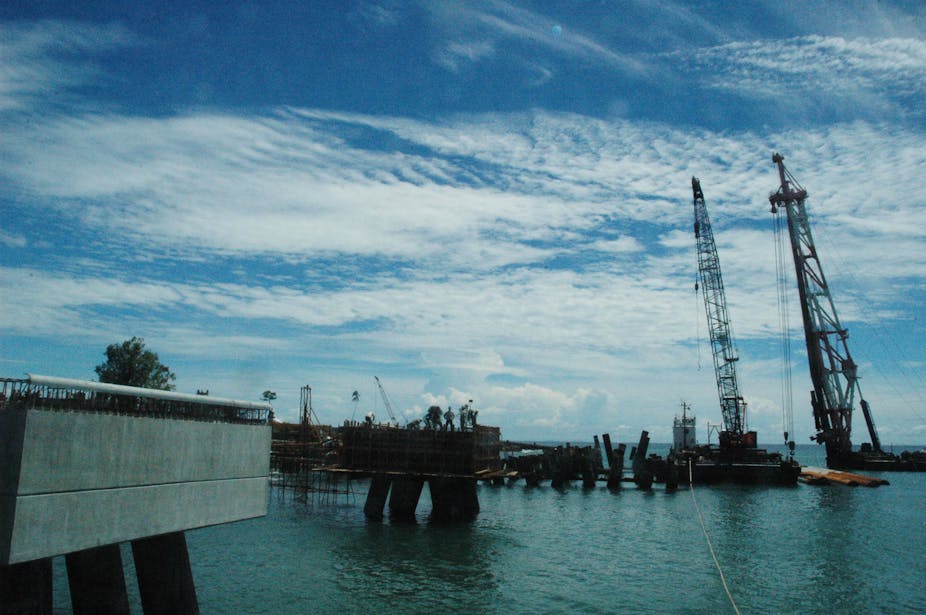A developed country, rich in natural resources, with relatively open and accountable governance lends its support to a global transparency initiative – what does this mean for the world’s poor?
It depends on how you view private governance mechanisms such as the Extractive Industries Transparency Initiative. While Australia’s pilot of the EITI is an important step in promoting improved extractive industry governance throughout the region, Sara Bice is correct to question the effectiveness of this initiative in developing states such as Papua New Guinea.
The Initiative is the foremost form of private governance in the extractive industries and was created not to help OECD states such as Australia monitor government revenues, but instead to assist developing states in managing resource incomes. The Initiative has 14 compliant and 22 candidate countries, the majority of which are developing states.
Australia’s pilot scheme, however, does not support the goals of the EITI by monitoring Australian mining companies operating overseas; the responsibility for this lies with the host countries. In many cases international extractive firms, operating in developing states, are more powerful than their host governments, an issue which the EITI seeks to redress. However, even the industry’s own governance institution has faced push-back from powerful miners in regards to project-by-project disclosure, as Bice notes.
Proponents of the EITI argue that private governance can supplement state institutions in improving resource sector management. However, as Bice and others have shown, the power of multinational mining firms is unlikely to be overcome that easily.
Zambia’s experience with global extractive firms is indicative of what developing states such as PNG can look forward to. In 2007, the Zambian government sought to increase mining royalty and corporate tax rates from 0.6% and 3% to 25% and 30% respectively, yet failed due to significant resistance from more powerful mining interests.
Under the direction of Western donors, the Zambian government engaged the EITI to effectively privatise resource sector management. However, as explained below, membership is unlikely to be a panacea to the problem of poor resource management in Zambia, or in other developing states.
The EITI’s goals are laudable, yet they alone are not sufficient to break the cycle of poverty in developing states. Firstly, EITI standards apply only to revenues, ignoring the important expenditure side of developing government budgets.
Secondly, an excessive focus on transparency and accountability makes significant assumptions about civil society in developing states. It assumes that a civil society does not exist, or that it is ignorant to rampant corruption.
Instead, the opposite is often true: citizens are aware of patronage, yet are unable to protest corruption within the confines of authoritarian states. Supporters of the EITI argue that such initiatives create a vibrant civil society; instead, they in fact rely on a vibrant civil society to succeed. Just ask the citizens of EITI compliant countries, such as the Democratic Republic of Congo and Chad, who are yet to benefit from increased transparency.
Lastly, companies which operate in an EITI country and sign up as EITI “supporters” are required to do no more than any other company operating within the implementing country. The EITI website notes that “[b]eing a supporter of the EITI does not require any reporting or disclosure requirements in addition to those for all companies operating in the relevant sectors in countries implementing the EITI”. Instead, membership of the EITI can mean added legitimacy and authority for firms, which are now able to lay claim to being “responsible corporate citizens”.
On this last point, Bice highlights the improved contributions mining firms are making to development goals through the funding of schools and hospitals, a vast improvement on community disasters of the past. This, however, ignores the fact that community development is simpler and more cost effective than supporting greater governance through measures such as an improved taxation system or transparency in the allocation of mining rights.
Australia’s support of the EITI is important and will complement that of others in the region – specifically, the Solomon Islands and Timor-Leste.
However, Australia’s support does little to directly assist developing countries in which our many mining companies operate, such as PNG. These states continue to face issues of poor governance, exacerbated by strong international extractive firms which are able to push back on sector reform.
The implementation of the EITI’s accords, by developing states, should not be seen as a panacea - as outlined above the Institution faces significant challenges, foremost from its own members and supporters.

